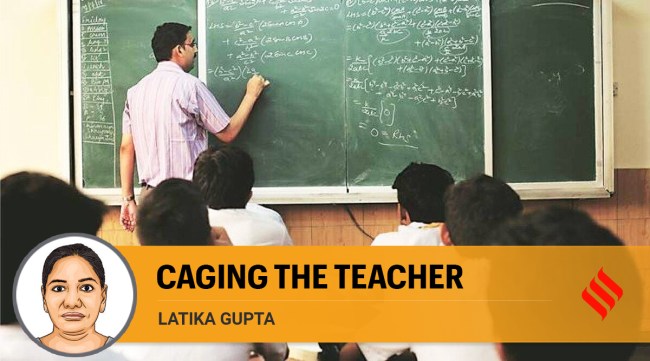Opinion Why Andhra’s face recognition system for teacher attendance won’t reform education
A teacher’s presence is, of course, necessary but it's more important for he/she to possess curiosity and pass on the spirit of inquiry to students. These issues require a humanist understanding of teachers as professionals, their predicaments and needs, not surveillance systems
 Issues related to teachers' absenteeism cannot be resolved by an app. (Representational/File)
Issues related to teachers' absenteeism cannot be resolved by an app. (Representational/File) A face recognition attendance system has been put in place in schools in Andhra Pradesh. Teachers’ attendance is recorded twice a day. Alerts are then sent to administrative officials via SMS informing them about the longitude and latitude of the place where the teacher is present. This policy change is aimed at raising the quality of education and improving the learning experiences of students, including their assessment of the formative level.
Several reports have hailed this move as a revolutionary shift that will help children develop an array of abilities and provide them with experiences that will enhance their problem-solving and critical-thinking faculties. The assumption is that the mere presence of teachers in a school is enough for the students to acquire these abilities. This is nothing new in this. Teacher absenteeism got recognised as a systemic issue almost four decades ago and became a policy goal soon after that. Keeping teachers in their schools has become an end in itself and the policies framed to ensure this have an inspectorial character rather than a reformatory one. While the policy actors have assumed a link between the app-governed attendance system for teachers and the acquisition of intellectual skills by students, the teachers’ unions have described the policy as problematic.
The teachers have also been criticised for opposing the merger of later primary grades with high schools. Efforts are being made to bring them on board, probably by offering them incentives. So far, the behaviourist schemes of policymakers were restricted to students, but it seems now that teachers too are being targeted. Reward and punishment postings have, of course, been part of the system for long. However, what is new is the link between the policy measure and its intended result. A teacher — who has to be “motivated” and offered “incentives” to download an app — is expected to build intellectual abilities and make learning enquiry-driven. How marking a teacher’s face on an app will lead to the acquisition of intellectual abilities by his/her students remains a puzzle. The teachers and their unions in Andhra Pradesh have identified the problems with looking at primary education as a sub-set of the secondary school system. They have also questioned the attendance app. However, that has been rebuffed as teacher scepticism and attributed to a work-shirking attitude.
Issues related to teachers’ absenteeism cannot be resolved by an app. They require a humanist understanding of teachers as professionals, their predicaments and needs. The idea of a surveillance system to control the teacher has been tried several times. Sudden visits by school inspectors, community supervision and even panchayat scrutiny were part of educational policies of the past three decades. Like the app-based attendance recording system, these surveillance mechanisms failed to appreciate that teaching is fundamentally a social interaction. It is about students and teachers putting their minds together. There seems to be a sense of fatigue amongst the educational community that the goals remain largely the same, plan after plan and project after project.
A teacher’s presence is, of course, necessary but it’s more important that he/she has curiosity and passes on the spirit of inquiry to students. The Reports of the National Commission on Teachers (1983-85), NCF-2005 and the NCFTE (2009) have much that’s useful for this purpose. All three policy documents argued for treating teachers as professionals and not as caged employees whose presence has to be constantly monitored. Two decades ago, UNESCO described the attitude of policymakers towards teachers as a silent crisis by asking, Where Have All the Teachers Gone? The face recognition app might end up highlighting the same crisis at the cost of massive investment.
The writer teaches education at the University of Delhi





